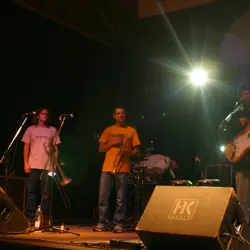 Groundation
GroundationOn a steamy Jamaican evening ahead of Groundation's three-date Australian stopover, vocalist and guitarist Harrison Stafford recalls the outfit's first two visits with a lovely rhythmic lilt one could listen to all day.
“It was great!” he exclaims. “The first time was kind of no-holds-barred, just go and play the shows, and the crowds came out and the energy was there; you realise that people knew Groundation's music. And then the next time we came back for the WOMAdelaide shows. That was really a great experience to be part of this eclectic, worldwide event from Africa to India to Iran to Portugal… The first two experiences were wonderful so I'm sure the third will be even better!”
As festival favourites who have played in 38 countries across six continents since their debut release in 1999, Stafford explains why a Groundation headline show is a real treat for the eight-piece band and fans alike.
“We all met at university and we were all the time playing and performing and studying jazz music together, so it's nice to have your own show; there's no timeframe problems… A lot of the time even though you might not be playing to 10,000 people like the festivals, you're playing to people who really know and appreciate the music and they want that once-in-a-lifetime, this-is-the-moment, this-is-the-night Groundation – all this improvising is never gonna be repeated again at a show. That's what is great about having our [headline] shows.”
Don't miss a beat with our FREE daily newsletter
Groundation are a part of a roots/reggae elite that barely register on the mainstream radar despite building large and fiercely loyal audiences through working the international tour circuit year after year.
“I think what comes with reggae music and what comes with Groundation is commitment to the sound and to the evolution of the music and not so much to pop culture and trying to be something that is gonna [make you] a millionaire,” Stafford says. “Reggae music has proven to be a part of social change, to be a part of the underground consciousness. That's why reggae music is always gonna be underground, that's why you'll never be calling me and sayin', 'Wow, I saw you all over MTV, or a reality TV show and you have millions of records sold!' We're never gonna have this conversation, and that's because what our main focus is, is trying to uplift people, to breaking down these barriers that really separate us. The barriers are within our culture, within our races, within our classes, and the barriers in our education system. So as long as we, [creators of] reggae music – conscious music – stick to these themes, there will always be a strong following for it.”















